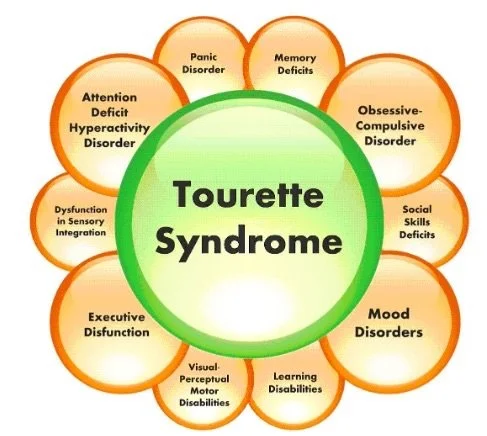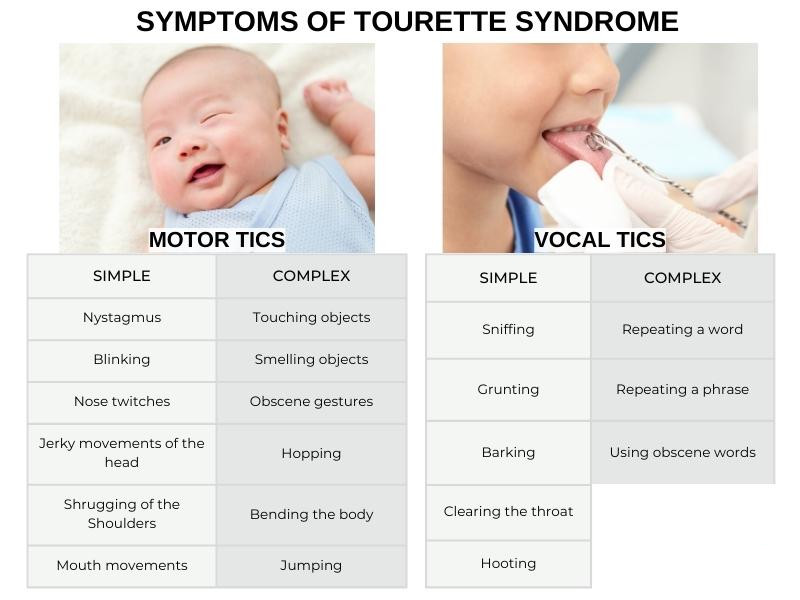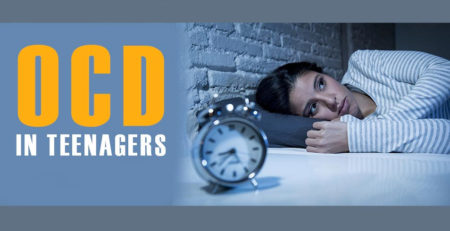Recognizing the Early Signs of Tourette Syndrome in Children
Tourette Syndrome is a neurological disorder that affects both children and adults. It can be very challenging for parents to identify the symptoms of Tourette Syndrome in their children, as the symptoms may not always be visible. As with most neurological disorders, diagnosis and treatment options are more effective if symptoms are recognized at an early stage. This blog post aims to provide useful information on the early signs of Tourette Syndrome in children so that parents can seek help sooner rather than later.
Tics: A child with Tourette Syndrome may experience tics, which are involuntary movements or vocalizations that occur repeatedly. Common tics include eye blinking, facial grimaces, throat clearing, or sniffling. Tics may be noticeable or subtle, but they are often more noticeable when the child is experiencing stress or anxiety.
Obsessions and Compulsions: Some children with Tourette Syndrome may display obsessive-compulsive behaviors, including repetitive hand washing, counting, arranging things in a certain way, or having extreme fears about germs or contamination.
Behavioral Issues: Tourette Syndrome may also cause children to experience behavioral problems such as impulsivity, hyperactivity, and difficulty with social interaction. They may have difficulty following instructions, may interrupt conversations, and may have trouble making friends.
Sensory Sensitivities: For some children with Tourette Syndrome, sensory sensitivities can be challenging. They may be sensitive to sound, light, touch, or smell. They could feel uncomfortable in crowded places, avoid certain textures of food, and be prone to meltdowns if touched unexpectedly.
Emotional Issues: Many children with Tourette Syndrome, like other children with neurological disorders, may experience challenges in managing their emotions. This might include difficulty in understanding and regulating their emotions, resulting in outbursts, frequent mood swings, or an inability to cope with stress.
What are the symptoms of Tourette syndrome?
Tourette syndrome is a complex neurological condition characterized by tics – sudden, repetitive, and often uncontrolled muscle movements or sounds. These tics can be simple such as blinking, throat clearing, or sniffing, or they can be more complex, like repeating words or copying the movements of others. The frequency and complexity of tics can vary widely from person to person and change over time. While some children may have mild and occasional tics that do not interfere with their daily life, others may have more severe tics that may impact their ability to complete everyday tasks. It is essential to understand that each child with Tourettes is unique and may present symptoms differently, which makes personalized care an essential part of managing the condition effectively. Symptoms may include:
- involuntary, purposeless motor movements (may involve different parts of the body, such as the face, neck, shoulders, trunk, or hands)
- head jerking
- squinting
- blinking
- shrugging
- grimacing
- nose-twitching
- any excessively repeated movements (i.e., foot tapping, leg jerking, scratching)
Some of the more complex tic behaviors associated with Tourette syndrome may appear purposeful and may include the following:
- kissing
- pinching
- sticking out the tongue or lip-smacking
- touching behaviors
- making obscene gestures
In addition to some or all, of the above symptoms, Tourette is also characterized by one or more vocal tics (meaningless sounds), for a diagnosis to be made, including the following:
- grunting or moaning sounds
- barks
- tongue clicking
- sniffs
- hooting
- obscenities
- throat clearing, snorts, or coughs
- squeaking noises
- hissing
- spitting
- whistling
- gurgling
- echoing sounds or phrases repeatedly
For children and adolescents who have Tourette syndrome, the challenges can be numerous. Attention problems affect 40 percent of these individuals, while academics suffer for 30 percent. Interestingly, however, most individuals do not have a primary learning disability, and intelligence levels are relatively consistent with those who do not have Tourette syndrome. Unfortunately, symptoms of obsessive-compulsive disorder are prevalent in 25 to 30 percent of individuals diagnosed with Tourette syndrome. This condition creates an ongoing intrusive thought, fear, or activity, which is then managed through ritualized conduct to reduce anxiety. Due to the complexity of Tourette syndrome, it’s essential to consult with a physician for proper diagnosis and treatment.

What causes Tourette syndrome?
Tourette syndrome is an exciting and complex condition that affects both males and females. It is intriguing because it is an autosomal dominant disorder, meaning that just one copy of the gene is required for the condition to manifest itself. This means parents carrying the gene have a 50/50 chance of passing it on to their children. While it is genetic primarily, up to 15% of cases arise from non-genetic causes. Various factors, such as complications during pregnancy or head trauma, have been linked to the onset of Tourette syndrome. Contrary to popular belief, Tourette syndrome is much more than just a series of tics and vocalizations; its underlying causes continue to be studied and debated by researchers worldwide.
Tourette syndrome is a complex neurological disorder that affects both children and adults. One of the most intriguing aspects of this condition is that dominant disorders exhibit incomplete penetrance. This means that even if a parent passes on the gene for Tourette syndrome, not everyone will have symptoms. This can be both a blessing and a curse for families who have loved ones with Tourette syndrome. On the one hand, it means that some people may never develop symptoms even if they have the gene. However, conversely, it can make it difficult to predict who will be affected by Tourette syndrome. In particular, if a daughter inherits the gene, there is only a 70 percent chance that she will have symptoms. However, if a son inherits the gene, there is a much higher chance that he will develop Tourette syndrome. Understanding these statistics can be helpful for families who are trying to understand and support loved ones with this condition.
Tourette syndrome, like many other genetic disorders, can exhibit variable expressivity. This means that the gene responsible for the syndrome can manifest itself differently in different people. Two individuals with Tourette syndrome can present different symptoms, with one having obsessive-compulsive disorder, another having chronic tic syndrome, and a third having full-blown Tourette syndrome. Additionally, this gene expression differs between males and females, with males being more likely to develop full-blown Tourette syndrome or chronic tics. In contrast, females are more likely to exhibit obsessive-compulsive disorder. This unique characteristic of Tourette syndrome further complicates its diagnosis and treatment.
Diagnosis & Treatments
How is Tourette syndrome diagnosed?
Tourette syndrome can be a complex condition, but identifying it in children and adolescents is a crucial step toward getting the proper treatment. It’s not just about looking at a single symptom or behavior but taking a comprehensive approach to evaluating a child’s psychological, social, and educational status and their medical, developmental, and family history. The process involves gathering a detailed history from parents and teachers and carefully observing a child’s behavior. That’s why it often takes a pediatrician, child psychiatrist, or qualified mental health professional to make a diagnosis – they have the expertise and training to uncover all the different factors that can contribute to Tourette syndrome.
What is the treatment for Tourette syndrome?
Specific treatment for Tourette syndrome will be determined by your child’s physician based on:
- your child’s age, overall health, and medical history
- the extent of disruption caused by tic behavior
- your child’s tolerance for specific medications, procedures, or therapies
- expectations for the course of the syndrome
- your opinion or preference
While Tourette Syndrome (TS) may not permanently be disabling, its impact on a child’s or adolescent’s self-concept, family and peer relationships, and classroom participation can still be significant. For those who experience interference in functioning or school performance or who have accompanying disorders such as obsessive-compulsive disorder or attention-deficit/hyperactivity disorder, effective medications are available. With the right treatment, children with TS can function well at home and in a regular classroom. However, those with emotional or learning problems may require additional support through special classes, psychotherapy, and/or medication. Determining the right course of treatment is essential in addressing the needs of these individuals.
Tourette syndrome is a complex condition whose underlying genetics can be quite confusing. That’s why families diagnosed with Tourette’s need to seek out the help of a specialist. Genetic counseling from a geneticist or genetic counselor can be a real lifeline in navigating the tricky waters of diagnosis and potential complications. With their expertise, individuals and families can better understand the causes of Tourette syndrome and what they can do to manage the condition effectively. Genetic counseling is especially important in helping families make informed decisions about their health, ensuring they can access all the resources and information needed to stay healthy and strong.
Tourette Syndrome can be challenging for both children and parents. One of the most significant difficulties is recognizing the early signs of the condition since some symptoms can be so subtle or even be mistaken for other disorders. This can lead to misdiagnosis and mismanagement of the condition. If your child exhibits any of the above symptoms, it is a good idea to seek professional help from a qualified medical professional. With proper diagnosis and intervention, children with Tourette Syndrome can lead fulfilling lives and better manage their symptoms. Remember, early recognition and treatment are crucial to the success of any therapy protocol.
Contact us today at 816.819.5166 or schedule your appointment online.












